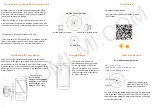
5 Implementation of EtherNet/IP
5.1 The EtherNet/IP communications profile
XI/ON: XNE-GWBR-2ETH-IP
09/2011 MN05002007Z-EN
www.eaton.com
53
5
Implementation of EtherNet/IP
5.1
The EtherNet/IP communications profile
EtherNet/IP is based on a connection-oriented communication model. This means that it is
only possible to exchange data via specified connections assigned to the devices.
Communication between the nodes in the EtherNet/IP network can be carried out either via
I/O Messages or Explicit Messages.
5.1.1
I/O Messages
I/O Messages serve to exchange high priority process and application data over the network.
Communication between the slaves in the EtherNet/IP network is carried out according to the
Server/Client Model, which means a producing application transmits data to another or a
number of consuming applications. It is quite possible that information is passed to a number
of Application Objects in a single device.
5.1.2
Explicit Messages
Explicit Messages are used to transmit low-priority configuration data, general management
data or diagnostic data between two specific devices. This is a point-to-point connection in a
Server/Client System that requires a request from a client always to be confirmed by a
response from the server.
Explicit messages, whether connected or unconnected, use the Message Router (for detailed
information, read Section „Message Router Request/Response Formats”, Page 59).
• Message Router Request
Consists of a service code, path size value, a message router path and service data. An
EPATH is used in the message router path to indicate the target object.
• Message Router Response
Consists of a service field with the most significant bit set. This is an echo of the service
code in the request message with the most significant bit set. A reserved byte follows the
service code, which is followed by the General Status code.
5.1.3
Communications profile of the XI/ON EtherNet/IP gateway
The EtherNet/IP gateway behaves as an EtherNet/IP Server in the network; the scanner of the
higher-level controller operates as a EtherNet/IP Client.
The following EtherNet/IP communications types are supported:
• Point to Point or Multicast
• Cyclic Connection
• Unconnected (UCMM) Explicit Messaging
• Connected Explicit Messaging
















































